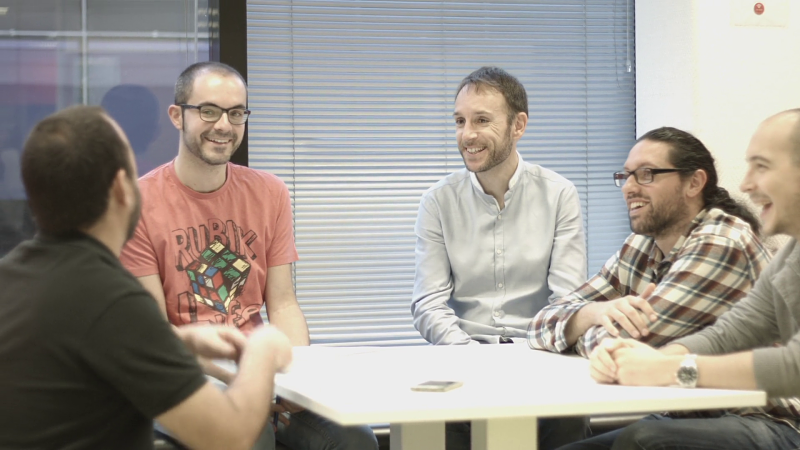2017 ended with new years resolutions from Spanish companies to improve and adapt to the new digital environment.
However, these resolutions are still far from becoming a reality. Mainly because some positions of responsibility act under the bias of their previous experience in a radically different environment.
"We can not solve problems using the same reasoning that we used when we created them", Albert Einstein.
To better understand this situation, let's look at five mistakes, each one associated with a role or team that we have found to be recurrent in many large Spanish companies.

The CEO: everything is fixed with a strategic report
Any self-respecting transformation process begins with a traditional life-long consulting analysis. It's like a kind of kick-start with a cost of 6 figures that reaffirms how important it is to transform if you want to remain competitive in your sector, that you start working in Agile, that you bet on Big Data technologies ...
A series of very expensive facts, that serve only to convince some stragglers who still think that their sector is not affected by digital transformation, but little else. This study usually initiates a small organizational change, but it is useless in the face of real change, which requires more actions and less PowerPoints.
The CTO: everything is fixed with tools
The vision of a CTO of all life is that each problem is fixed with a tool. If you want to be agile, Jira is implanted; to lower the time to market we installed Jenkins; and if there are distributed teams, Git solves it.
But the reality is that the tools are useless if the principles are not internalized. Part of the problem lies in the temptation of software manufacturers who, like miracle peddlers from the Far West try by all means to place their products without actually diagnosing the problem, or internalizing the root of the change.
What CTO hasn’t suffered having a BMP? But let's be realistic, you can work as a team without Git as you can be agile without Jira, because in the end, the tools do not stop being nothing more than support.
HR: everything is fixed with trainings
The vision of human resources is that the digital environment requires a series of new capabilities in people and those skills are acquired with training. To start working with agility, the first thing is to receive a training, probably taught by the usual provider, who works in a traditional way and prepares the training quickly for the occasion.
But neither the longest and most complete of trainings is comparable to participating in a real sprint and experiencing it in first person. So what you have to do after learning the basics, is to choose a driver and start testing as soon as possible.
The most advantaged ones go from training to an Agile Coach or even an Agile Coach horde if the thing does not advance. But to transform the way you make software you need a multidisciplinary team, because the method is as important as the associated engineering practices, and for that you need sharp engineers as well as coaches.
Legal department: everything is fixed with a "no"
The human being does not want messes and less so in hierarchical companies where the most important thing is not to make mistakes in order to maintain your position. For this reason, the legal department tends to carry out its work very strictly.
It is not that they are not right, probably "it can not be done" on paper, but you have to want to do it. Success is for the brave, so remember that the law is open to interpretation and always goes slower than technology.
Almost all successful startups have brought innovations that others dismissed as impossible. We even know a case in which innovation was able to force legal change, it just had to be requested.
Would Uber, Airbnb or Spotify exist if they had stopped at the least legal impediment?
Purchasing Department: everything is fixed with contracts
Another one of those issues that shows that you do not really understand everything that is happening is to let your purchasing department continue to act in the same way as it did 10 years ago.
This way of acting, with project specifications with a closed scope, scores by sections (the price that highest scores, of course) and penalties for non-compliance, are obviously incompatible with a relationship of trust.
These spreads prioritize hard relationships, if your provider is "your provider" it will never be "your partner" and, therefore, you will never be a team.
Why do you think startups with 10 people tend to get more than huge departments from hundreds of people? Because they are a team. Technology is not a cost center, but a fundamental part of your business.

The digital transformation is a profound renewal in companies, with an impact comparable to the industrial revolution of the eighteenth century. And a change of this magnitude is not solved with trainings, neither with tools nor with consulting reports, it is solved by "doing".
You have to start transforming small groups or departments from start to finish, from the organizational model to the tools to be used, emphasizing the important thing: the necessary change of thinking.
Just as we have already thrown away (or hopefully so) the shirts with shoulder pads and bell-bottoms of the 80s, the roles with certain responsibility of the company must get rid of the old paradigms before initiating the change, because being digital is more to do with attitude than knowledge.
Comments are moderated and will only be visible if they add to the discussion in a constructive way. If you disagree with a point, please, be polite.





Tell us what you think.